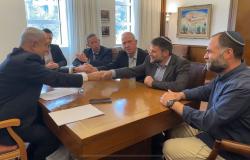
six candidatesmost conservativeswere authorized to appear at Iran presidential election from June 28 to replace Ebrahim Raisiwho died in a helicopter crash in May, the Interior Ministry announced on Sunday.
He Council of Guardians of the Constitutiona non-elected body dominated by conservatives and in charge of supervising the electoral process, validated these candidacies among the eighty presented.
Among the six authorized is the conservative president of Parliament, Mohammad Baqer Qalibafthe mayor of Tehran Alireza Zakani and Said Jaliliultra-conservative nuclear negotiator.
They were also selected Amir Hosein Ghazizadeh Hashemithe ultraconservative head of the Martyrs Foundation, and Mostafa Purmohammadiformer Minister of the Interior.
The only reformist in the race is Masoud Pezeshkiana deputy from the northwestern city of Tabriz and former Minister of Health.
On the other hand, the Council once again prevented the former president from appearing Mahmoud Ahmadinejadan incendiary populist known for the repression that followed his controversial reelection in 2009. At 67, Ahmadinejad wanted to return to the position of president he held from 2005 to 2013. He had already been removed from the presidential elections in 2021 and 2017.
The candidacy of another veteran of the Islamic Republic, Ali Larijaniformer president of Parliament considered moderate, was also rejected.
The Guardian Council did not publicly justify its decisions.
The Council’s decision marks the starting signal for a abbreviated two-week campaign to replace Raisia hardline protégé of the supreme leader, the Ayatollah Ali Khameneiwho at the time was nominated as a possible successor to the 85-year-old cleric.
The selection of candidates approved by the Guardian Council, a group of clerics and jurists ultimately overseen by Khamenei, suggests that the theocracy Iranian Shiite hopes to facilitate electionsafter the last votes recorded a unprecedented low turnout and that tensions continue to be high due to the rapid advance of the nuclear program of the country, as well as the war between Israel and Hamas.
Additionally, the Guardian Council continues its streak of do not accept a woman or anyone who asks for a radical change in the governance of the country.
It is likely that the campaign includes debates televised live on Iranian state radio and television. They will also advertise on billboards and give speeches to support their candidacies.
So far, none of them have offered concrete details, although everyone has promised a better economic situation for the countrywhich suffers sanctions from the United States and other Western countries for its nuclear program, which is now enriching uranium closer to weapons-grade levels than ever before.
These matters of state remain Khamenei’s final decisionbut presidents of the past have leaned toward compromise or confrontation with the West on the matter.
The most prominent candidate remains the president of parliament Mohammed Bagher Qalibaf62 years old, former mayor of Tehran and closely linked to the paramilitary Revolutionary Guard of the country. However, many remember that Qalibaf, as a former general of the Guard, was part of a violent repression against students Iranian university students in 1999. He also reportedly ordered the shooting of students with live fire in 2003, when he was the country’s police chief.
Qalibaf He ran unsuccessfully in the 2005 and 2013 presidential elections. He withdrew from the 2017 presidential campaign to support Raisi in his first failed presidential bid. Raisi won the 2021 election, which saw the lowest turnout ever in a presidential vote in Iran, after all of his main opponents were disqualified.
Khamenei gave a speech last week in which he alluded to qualities that Qalibaf supporters have been highlighted as a possible sign of the supreme leader’s support for the speaker.
However, Qalibaf’s role in the crackdown can be seen differently following the years of turmoil that have gripped Iran, both over its battered economy and the mass protests sparked by the 2022 death of Mahsa Amini, a young woman who died after being arrested for allegedly not wearing the veil, or hijabto the liking of the security forces.
The elections are held in a moment of great tension between Iran and the West due to its support for Russia in the war against Ukraine. His support for militant forces in the Middle East has increasingly been in the spotlight, as rebels Houthis of Yemen attack ships in the Red Sea for the war between Israel and Hamas in the Gaza Strip.
Raisithe Iranian foreign minister, Hossein Amirabdollahian, and others died in the May 19 helicopter crash in far northwest Iran. Investigations continue, although authorities say there are no immediate signs of sabotage in the accident on a fog-shrouded hillside.
Raisi is the second Iranian president to die in office. In 1981, a bomb explosion killed the President Mohammad Ali Rajai in the chaotic days following the country’s Islamic Revolution.
(With information from AFP and AP)





